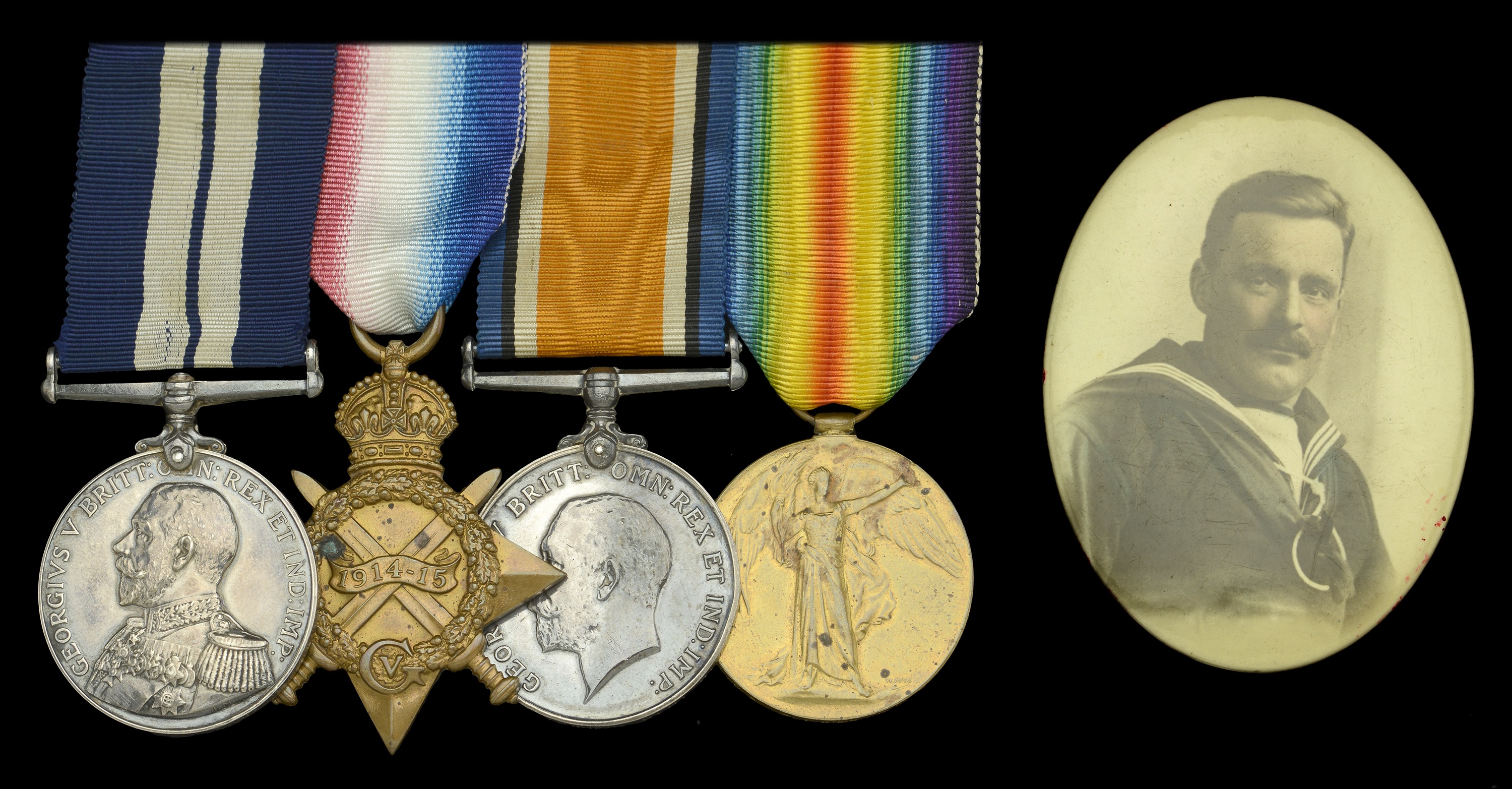A Great War ‘1918 Dover Patrol’ D.S.M. group of four awarded to Deck Hand A. Towner, Royal Naval Reserve, for his gallantry in H.M. Drifter Golden Rule during an enemy raid in the Dover Straits on the night of 14-15 February 1918 – his ship was severely damaged, and of the crew of seventeen, ten were killed and three were severely injured Distinguished Service Medal, G.V.R. (D.A.4660. A. Towner. Dk. Hd. R.N.R. “Golden Rule” Dover Patrol. 14-15 Feb. 1918) minor official correction to ship; 1914-15 Star (D.A.4660, A. Towner, D.H., R.N.R.) British War and Victory Medals (4660D.A. A. Towner. D.H. R.N.R.) a few minor verdigris spots to both Star and VM, otherwise good very fine (4) £800-£1,000 --- D.S.M. London Gazette 16 March 1918: ‘For services in action on the occasion of the raid into the Straits of Dover by enemy destroyers on the night of 14-15 February 1918.’ Arthur Towner was born in Lowestoft on 9 July 1878 and enrolled in the Royal Naval Reserve on 22 February 1915, serving during the Great War in the Drifter Golden Rule from that date. On the night of 14-15 February 1918, a dramatic raid took place by German destroyers against vessels of the Dover Patrol, causing serious losses which included the sinking of one armed trawler and seven drifters. The enemy’s object was to destroy the ‘light barrier’ as they called the British flare ships, whose effect was to make the Straits of Dover almost impassable. Two half flotillas of destroyers were employed on the raid. Between Folkestone and Griz Nez there existed a series of buoys which were used to assist the patrols to maintain their positions. About two and a half miles on either side of this line were stationed trawlers, paddlers and other small craft, to either burn flares or to use searchlights. There was also fifty-eight drifters patrolling this line. At 12.40 a.m. one half flotilla of four destroyers started the attack from the NW by shelling the paddler Newbury, whose revolving searchlight made her an easy target. The destroyers then proceeded slowly down the drifter line and sank the drifters W. Elliot and Veracity. The paddler Lingfield and a motor launch also came under fire, but some drifters managed to make their escape. The enemy then disappeared. Three destroyers made an attack from the SE at about 12.45 a.m. near the Griz Nez end of the line. The trawler James Pond was soon on fire. The crew endeavoured to extinguish the flames and beach her, but the vessel finally had to be abandoned. Proceeding along the line, the enemy shelled the drifter Clover Bank, which took fire, and afterwards sank. The destroyers then sank the drifters Cosmos and Jeannie Murray. Only four survivors escaped from these three craft. The next to be shelled were the drifters Golden Grain, Golden Rule, Violet May and Treasure, which were all damaged. At about 1.30 a.m. the Germans turned back when about halfway across the Channel and on the return journey met and sank the drifter Silver Queen, which had taken off the survivors of the Cosmos. Finally, after firing on two more drifters, these destroyers made off. This raid cost the Patrol heavy losses of men and ships. There were sunk one armed trawler, seven drifters, and one paddler and six drifters damaged. The subsequent awards included 7 Distinguished Service Crosses, 3 Conspicuous Gallantry Medals, and 13 Distinguished Service Medals, including that to Towner. For his gallantry, the skipper of H.M. Drifter Golden Rule, Skipper John Turrell, R.N.R., was awarded the D.S.C. in the same Gazette, the citation stating: ‘When his ship was severely damaged and ten of his crew had been killed and three badly injured, he displayed great courage and energy in giving orders to the remaining three hands although severely injured himself.’ Towner was possibly amongst those badly injured; he was invalided out of the Royal Naval Reserve on 2 June 1919, and was awarded a disability pension. Sold with an oval badge depicting a photograph of the recipient; and copied service record.
Auctioneer's Buyers Premium: 24% (+VAT)
There is an additional charge of 4.95% (+VAT/sales tax)
See Full Terms And Conditions





